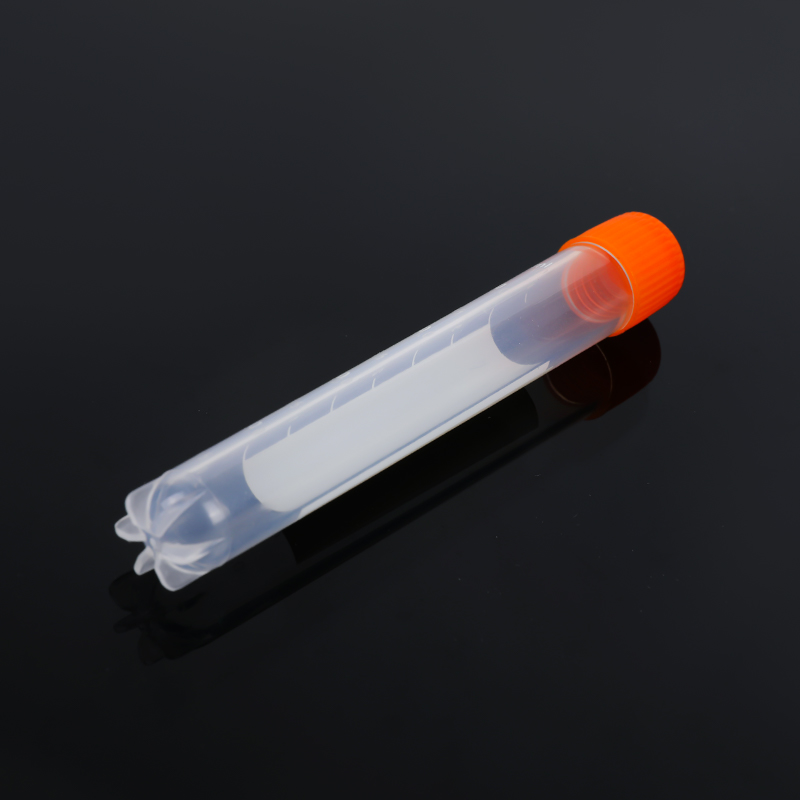Cryotubes, also known as cryogenic vials, are specialized containers designed for the safe storage and preservation of biological samples at ultra-low temperatures, typically below -80°C or even colder, such as in liquid nitrogen (-196°C). These tubes play a crucial role in various scientific and medical contexts where the long-term storage and protection of valuable biological materials are essential. Their primary purposes extend across multiple disciplines, from research laboratories to clinical settings, ensuring the integrity and viability of samples for future analysis, experimentation, diagnosis, and therapeutic applications.
1. Biological Research:
Cryotubes are widely used in biological research laboratories to store a diverse range of biological specimens, including cell lines, tissue samples, blood components, DNA, RNA, and proteins. By preserving these samples at extremely low temperatures, researchers can maintain their structural and functional integrity over extended periods. This enables scientists to conduct longitudinal studies, validate experimental findings, and explore new research directions without concerns about sample degradation.
2. Biobanking:
Biobanks are repositories that store and manage large collections of biological samples and associated data. Cryotubes are indispensable tools in biobanks, where they facilitate the establishment of vast sample libraries that support medical research, genomics studies, and disease investigations. These repositories serve as valuable resources for identifying biomarkers, developing personalized therapies, and advancing our understanding of various diseases.
3. Clinical Diagnostics:
Cryotubes are employed in clinical laboratories for the storage of patient samples, such as blood, serum, plasma, and tissue specimens. By freezing these samples, clinicians can ensure that they remain stable and suitable for subsequent diagnostic testing, disease monitoring, and retrospective analysis. Cryotubes play a critical role in maintaining the integrity of patient samples, which is vital for accurate diagnosis and treatment.
4. Regenerative Medicine:
In regenerative medicine and stem cell research, cryotubes are instrumental for the storage of stem cells, including embryonic stem cells, induced pluripotent stem cells (iPSCs), and adult stem cells. These cells have significant therapeutic potential for tissue regeneration and personalized medicine. Proper cryopreservation using cryotubes allows researchers and clinicians to bank these cells for future therapeutic applications, minimizing the risk of cellular damage and maintaining their differentiation potential.

5. Vaccine Development:
Cryotubes are utilized in the field of vaccine development to store viral and bacterial strains, as well as antigen preparations. Maintaining these components at ultra-low temperatures ensures their stability and viability for use in vaccine formulation and production. Cryotubes enable researchers to store and transport vaccine candidates, enabling the development of new vaccines to combat infectious diseases.
6. Forensic Science:
In forensic science, cryotubes are used to preserve biological evidence collected from crime scenes. This includes DNA samples, biological fluids, and tissues that might be required as evidence in legal proceedings. By freezing these samples, forensic experts can prevent decomposition and maintain the integrity of the evidence, ensuring accurate analysis and interpretation.
7. Agriculture and Environmental Studies:
Cryotubes are employed in agriculture and environmental research to store genetic material from plants, animals, and microorganisms. These samples can be used for biodiversity studies, conservation efforts, and genetic resource preservation. Cryotubes enable researchers to create cryobanks of plant seeds, animal tissues, and microbial cultures, safeguarding genetic diversity for future generations.
8. Drug Discovery and Development:
In pharmaceutical research, cryotubes are used to store compound libraries, cell lines, and other biological materials used in drug screening and development. By maintaining the stability of these samples at low temperatures, researchers can ensure the reproducibility of experiments and the accuracy of drug efficacy assessments.
In conclusion, cryotubes serve as essential tools in various scientific and medical contexts where the preservation of biological samples at ultra-low temperatures is crucial. From research laboratories to clinical settings, these specialized containers enable the long-term storage of valuable biological materials, ensuring their integrity and viability for a wide range of applications, including research, diagnostics, therapy development, and environmental studies. The use of cryotubes contributes to advancements in diverse fields and enhances our ability to understand, diagnose, and address complex biological phenomena and medical conditions.

 English
English 中文简体
中文简体













